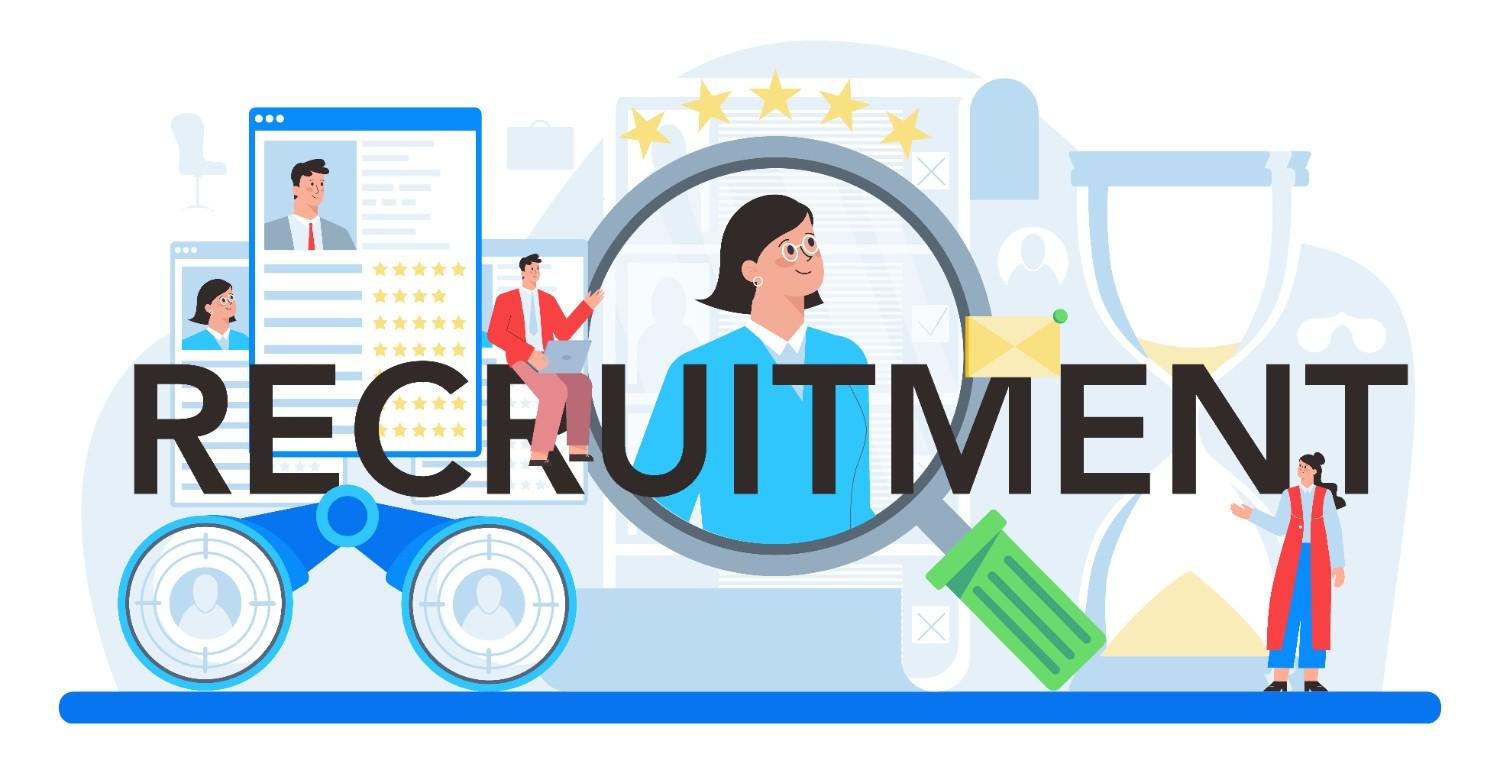Whoa! Have you noticed how much recruitment has changed in the last few years? The pandemic turned everything on its head, and we are all racing to adapt and keep up with the new trends. Are you curious about this evolving world of campus hiring automation and the future of recruitment? Let us have a look at it!
Gone are the days when recruitment was simply about filling vacancies. Today, it is about creating an unforgettable candidate experience, building an employer brand, and leveraging cutting-edge hiring technology, like automated recruiting software, to stay ahead of the competition.
That is just a fraction of what is happening in hiring and recruiting. There is a lot more that you have to know and remember to keep up.
So, let us get to the point. Shall we?

Top Recruitment Trends & Predictions 2023
It’s time to shake up your virtual hiring game and prepare for the future. With Automation, AI, chatbots, and virtual interviews taking over recruitment, you don’t want to be left behind.
Get ready to embrace the latest trends and predictions because the future of recruitment automation looks bright (and a little bit crazy!)
1. The not-so-surprising rise of remote hiring
Remote hiring gained momentum during the start of the pandemic, and it will not slow down anytime soon. The COVID-19 era necessitated a shift towards remote work culture for companies. Even today, many companies continue operating under full remote or hybrid team dynamics. That has significantly increased the demand for remote hiring, encouraging companies to tap into a global talent pool and hire top talent from anywhere in the world using virtual hiring software.
The Career Pulse Survey speak volumes about the changing preferences of the workforce.
97% of respondents desired some remote work arrangement. Specifically, 65% of respondents prefer working remotely full-time, while 32% prefer a hybrid work environment.
Now, this new trend has its benefits and challenges. For example, remote hiring can bring many benefits, such as increased flexibility, reduced costs, and access to a larger talent pool. But, it can also present challenges, such as difficulty in team communication and disregard for the company culture and values.
So, how can we successfully navigate these challenges? Here are some tips to keep in mind when assessing remote candidates:
- Emphasize communication
Communication is critical in remote hiring. Make sure to schedule regular check-ins and provide multiple communication channels to ensure a transparent and efficient exchange of information. Recruiters use automated recruiting software to schedule interviews and nudge eligible candidates via push notifications, SMS, emails, etc., so they don’t miss out on any opportunity.
- Assess skills for remote work culture
Remote work requires specific skills such as self-motivation, time management, and adaptability. Make sure to assess candidates for these skills during the hiring process.
- Conduct virtual interviews
Video interviews are a great way to assess candidates remotely and understand their personality and communication skills. Many recruiters use automated virtual hiring software, like Superset, giving them benefits like:
- 55% more interviews per day
- Interview recordings
- Custom feedback forms
- Virtual rooms for panellists to drag and drop candidates
- Multi-person calls
- Live interview statistics
- Track real-time movement of candidates
- Use technology to advantage
Tools like campus hiring automation software are a one-stop solution for all your hiring needs. It helps you to assess remote candidates more effectively.
2. The growth of automation and AI in hiring
Automation and Artificial intelligence (AI) are transforming the recruitment industry in ways that were once unimaginable. They are changing how companies recruit and hire talents, on-campus or off-campus.
Do you know those tedious tasks like scanning endless resumes and scheduling bulk interviews with shortlists? Well, automation technology handles that in a snap.
Automation and AI are the superheroes we need in the recruitment industry – making everything faster and fairer. Today, recruiters can streamline recruitment by automating manual, time-consuming tasks such as screening resumes, scheduling interviews, and conducting initial candidate assessments. As a result, recruiters can focus on more critical tasks, such as developing candidate relationships and hiring the best talent for their organization.
Remember,
Use Automation and AI as a tool, not a replacement. They are an accessory to human decision-making. While these tools provide valuable insights, they cannot replace a human recruiter’s nuanced judgment and intuition.
3. The importance of diversity and Inclusion in the workplace
Imagine a world where everyone looks, thinks, and acts the same. Boring, right?
Well, the same goes for the workplace!
Having a diverse group of employees means having different perspectives and ideas, which leads to creativity and innovation. Plus, an inclusive workplace creates an environment where all employees feel valued, respected, and supported, increasing productivity and job satisfaction.
And, you know what’s better than one great idea? A bunch of great ideas!
Building a diverse and inclusive team opens up possibilities for creativity and innovation. Each team member brings their unique perspective and experience, creating a vibrant tapestry of ideas and solutions. Moreover, fostering an inclusive work environment where everyone feels valued and respected fosters a culture of collaboration, communication, and teamwork, leading to increased productivity and success.
4. Scaling soft skills for success
Hey, did you know that soft skills are like the secret sauce of the workplace? Of course, technical skills are essential, but good communication, problem-solving, and teamwork skills can take your career to the next level!
According to research conducted by Harvard University, the Carnegie Foundation, and the Stanford Research Center,
An individual’s success in their job largely depends on their soft skills and ability to interact with others, which accounts for 85% of their overall job success. In contrast, technical skills and knowledge, known as hard skills, account for only 15% of job success.
So, what are the ingredients for a winning soft skills recipe?
Well, employers are looking for people with excellent communication skills, both written and verbal. They also love problem-solvers who can think creatively and develop innovative solutions. And remember teamwork – it’s like the flour that holds everything together!
How to Assess Soft Skills in Candidates? How can we tell if someone has the right soft skills for the job?
We can do this by asking open-ended questions requiring candidates to explain their thought processes and how they’ve used their soft skills. We can also look at their body language, tone of voice, and overall demeanour to see if they fit the team well. And just like a good chef tastes their food throughout the cooking process, we can get feedback from other team members who have worked with the candidate before.
5. Focus on building a better employer brand
Employer branding is like a magnet that attracts talented individuals to your company. It’s how you showcase your organization’s culture, values, and work environment to potential employees. Just like a delicious aroma attracts hungry people to a restaurant, a strong employer brand attracts the best candidates to your company.
Building a strong employer brand is like creating a masterpiece. It requires a combination of creativity, strategy, and hard work. Start by defining your company’s mission, vision, and values. Then, identify what sets your company apart from the competition.
Is it your flexible work culture, commitment to employee development, or fun team-building activities? Highlight these unique features in your branding efforts. Next, showcase your employer brand through various channels, such as social media, job boards, and career fairs. Finally, refine your employer brand to keep it fresh and relevant.
So, what are the benefits of having a strong, positive Employer Brand?
Having a positive employer brand is like having a secret weapon in the war for talent. It helps attract and retain top talent, increase employee engagement and productivity, and reduce recruiting costs. But that’s not all! A positive employer brand also improves your company’s reputation in the market, increases customer loyalty, and helps you stand out from your competitors. So, invest in your employer brand, and watch your company soar to new heights!
6. The need for making data-driven hiring decisions
Recruiting has always been like painting a masterpiece – an art form requiring skill, experience, and a bit of magic.
For a while, recruiters have been experimenting with using “results metrics” to measure success. Still, the tried-and-true method of relying on intuition and “established best practices” has remained the go-to approach. However, a sudden and exciting shift has occurred toward using data-based decision-making in virtual campus recruitment.
In 2023, with businesses being more mindful of their budgets, making every decision count is essential, and that’s where data comes in.
But how do these teams use data? It starts with setting the right KPIs (key performance indicators if you need to catch up on the lingo). First, consider your core goals, like improving internal mobility or increasing your offer acceptance rate. Then you can choose the KPIs that will help you measure progress towards those goals, like tracking internal hires or ensuring you have a speedy hiring process.
Stay moderate with too many KPIs at a time – choose the most important ones and set achievable targets.
7. Better candidate experience = Better recruiting
In the wild world of recruiting, giving your talent pool a positive experience is becoming increasingly important – it’s like rolling out the red carpet for them!
Surveys are a great way to get feedback from your candidates, and upgrading your career site can make a world of difference. Your candidates will not wander off if your processes are streamlined and easy to follow.
According to Glassdoor,
A staggering 89% of candidates believe that an employer’s job posting should convey the company’s mission and purpose in a way that’s easy to understand.
But wait, there’s more! The candidate experience doesn’t stop once they’ve joined the talent pool – it’s an ongoing journey. How you communicate with them, conduct interviews, and follow up shows them what your culture is all about. Suppose you want to attract the best candidates and snag them away from your competitors. In that case, you must ensure you’re giving them a top-notch experience from start to finish by using campus hiring automation software.
Here’s how you can elevate your candidate experience:
- Get your hands on some robust recruitment software that can challenge the status quo of your online experience.
- Personalization is critical in recruitment, and using virtual hiring software that supports consideration can make all the difference. Make sure you’re not just going through the motions – keep it personal!
- Improve your candidate engagement game by seamlessly integrating email conversations with candidate profiles using an interactive, user-friendly interface with automated alerts.
8. Revision of the onboarding process
The onboarding process is changing across businesses in every sector. A new employee’s initial weeks and months at a company gear towards ensuring their success while also fully engaging them with your employer brand.
Statistics reveal that over 20% of employee turnover occurs within the first 45 days of joining a company. Given that talent acquisition costs have risen significantly to over $23,000 per hire, such a high churn rate can severely impact your return on investment and overall financial performance.
So for that, streamline your hiring process with virtual recruitment solutions which collect and verify documents online, use digital signatures, and automate your offer rollout, saving up to 80% of the person-hours you spend on post-offer documentation.
Conclusion
Well, well, well, looks like the world of recruitment is getting a facelift!
From AI-powered candidate matching to virtual reality job fairs, it is safe to say that the future is looking pretty darn exciting. So, get ready to strap on your jetpacks and zoom into the future of recruitment, where the possibilities are as endless as the universe itself. And who knows, with all these cool new trends and predictions, we might end up recruiting the next Elon Musk or Jeff Bezos!
So go forth, embrace the future of recruitment, and let us work together to build a workforce that is diverse, talented, and ready to take on the challenges of tomorrow!
You might want to try India’s leading automation software, which automates more than 90% of your processes and give you 40% richer data. Sounds cool? Schedule a demo now.








